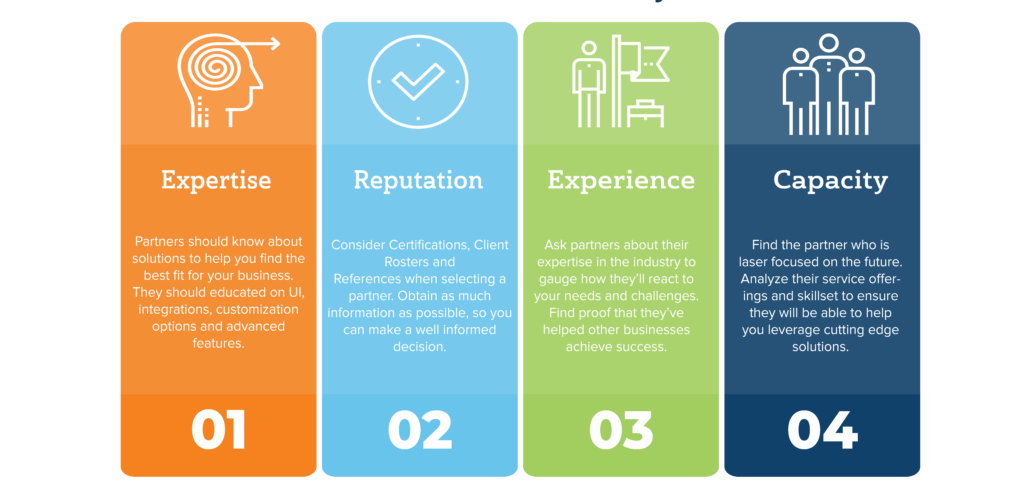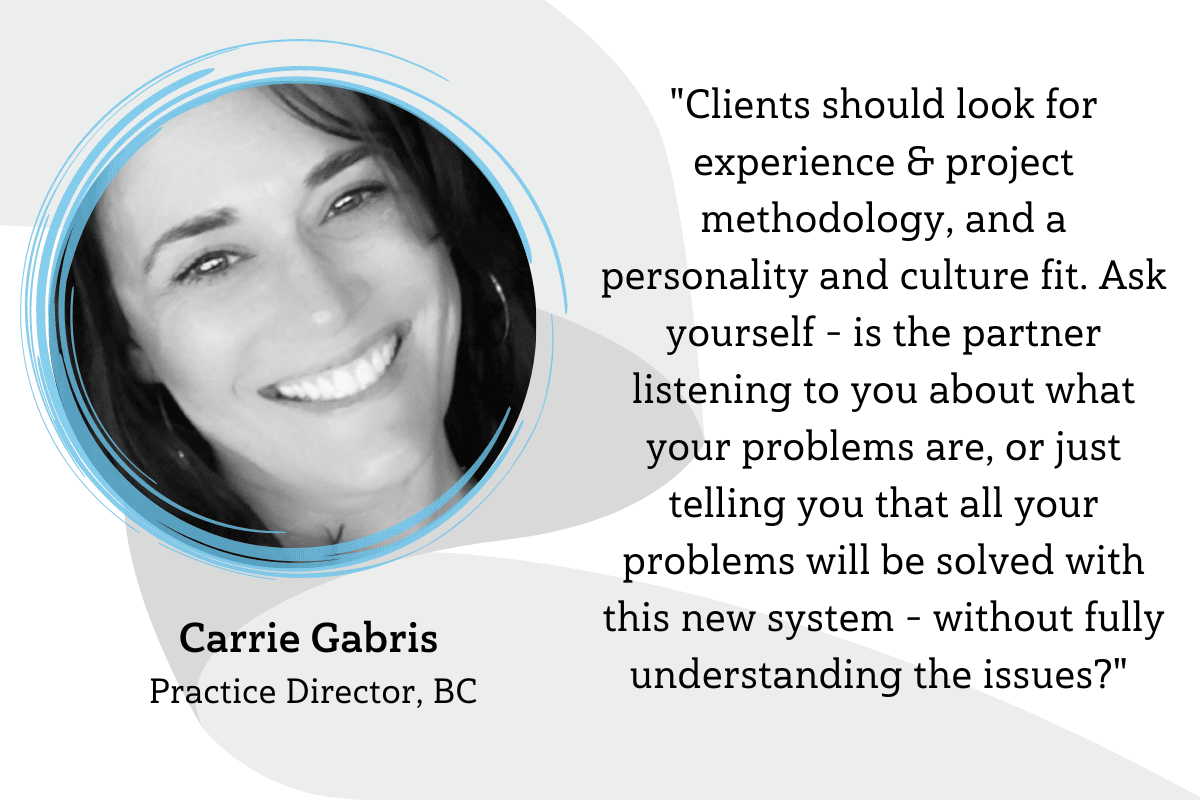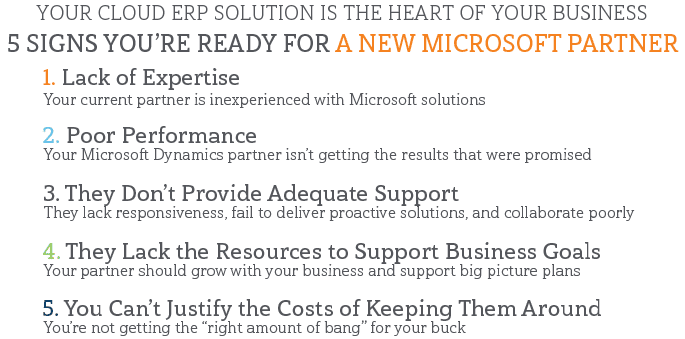What to Look for in a Microsoft Dynamics Partner
Here's what to look for in a Microsoft Dynamics 365 ERP consulting partner and questions you might use to determine who makes the final cut.
Table of Content
As with every part of your cloud ERP strategy, your Microsoft Dynamics partner must align with your business needs, processes, and goals. Which means, the word “partner” is key.
See, you’re not outsourcing the migration or implementation process. You’re not passing the buck on training or change management responsibilities, nor are you paying an external expert to define your company’s Dynamics 365 strategy on its own. You’re also not hiring someone for reactive break/fix services (though, yeah, that’s definitely part of it).
Rather, this should be a collaborative relationship–with both parties working together to achieve critical business objectives.
In this article, we’ll discuss what to look for in a Microsoft Dynamics 365 ERP consulting partner and share some sample questions you might use to determine who makes the final cut.

Your Microsoft Dynamics partner should bring in-depth product knowledge to the table, along with deep knowledge of everything from UI and integrations to customization options and advanced features.
Partners should know which solutions are most effective for achieving specific objectives and offer suggestions and guidance for leveraging D365’s features/functionality to maximize business value.
Here are some questions you might use to learn more about the expertise potential partners have to offer:
Solution Architect, James Thomas adds that you’ll also want to look for a partner with cross-cloud expertise.
“Find out if this partner is only great at the product you’re implementing or has expertise that spans the entire Microsoft cloud. You’ll likely want your Dynamics solution to integrate with Microsoft 365, Azure services, Power BI, and so on.” – James Thomas, Solution Architect
Ultimately, the big question becomes–does the partner have real expertise across all these solutions?
Even if you’re not using them now, they’ll likely factor into the next steps in your digital transformation journey. So, better to choose a partner that fits into the five, ten-year plan rather than focusing on the here and now.
After you’ve assessed a prospective partner’s Microsoft experience and the services they provide, you’ll want to make sure they’re legit. This isn’t as hard as you might think. It’s really just a matter of investigating firms from multiple angles.
At a minimum, you’ll want to look at the prospective partner’s:
Velosio Solution Architect, James Thomas says it’s a good idea to look for “recognition from Microsoft and a Microsoft rep/ambassador who is paid a commission based on the partner’s success.”
He adds, “Microsoft’s approval means the company will pay attention to you, communicating through the partner, if there’s something wrong with the product.” This means, they’ll be more likely to prioritize bug fixes, address errors, and eliminate friction points.
You can use Microsoft’s Partner Directory to find consulting services and partner solutions (essentially apps developed by partners in the MS network) to start identifying potential candidates. All third-party partners are certified based on their ability to meet certain competency standards across the following categories:

Note: if you look at Microsoft’s documentation, you’ll see that most partner certification info is written for partner organizations rather than their potential clients.
Still, it may offer relevant insights to those interested in learning what it means to earn Microsoft’s seal of approval. (For reference, here’s a look at the competencies & criteria used to score service providers.)
Additionally, you might use “best of lists” like Business Applications Inner Circle Award or the Bob Scott List to find top providers with specific competencies. Full disclosure: these particular examples do recognize Velosio as a top provider–but highlight other top picks, as well.
A long list of clients is a good sign that a potential service provider can deliver the results that were promised. Dig into their online presence and ask yourself the following questions:
You can find out which companies a firm has worked with on the front page of their website (usually a collection of recognizable logos), as well as in case studies, blog posts, and downloadable assets like e-books and white papers.
Note that, the companies that make the front page are typically the biggest, most recognizable clients that lend them more credibility/recognition. However, they’re not always the most relevant examples of past work. As such, you may be better off digging into the archives to learn more about their work with lesser-known or niche clients that look more like you.
Looking at clients is only the first step toward properly vetting potential partners.
James recommends trying to gage the “integrity of the implementation leadership. It’s hard to find but easy to find out. Just ask for references and look up the leaders who will be on your status calls during implementation.”
You can look up the companies featured on partner sites yourself and try to get in touch, though you might have better luck asking prospective partners if it’s possible to interview specific clients. They might be willing to make an introduction on your behalf–or at the very least, provide you with direct contact info. That way, you’re not reaching out completely cold–and you’ll be more likely to get a response.
Questions you might ask references about their Dynamics 365 partner:
The list goes on. Here, your goal is to come up with a series of questions to help you understand whether a prospective MIcrosoft Dynamics partner can realistically deliver on critical objectives.
Ask questions with the intention of surfacing specific answers. Aim for clarity–avoid asking leading or multi-part questions that complicate the evaluation process.
It’s not just about big-name clients and recognition from Microsoft you still need to make sure you find a partner that “gets” your business.
You want to find a partner who knows exactly what it takes to move the needle on high-level business goals.
Your Dynamics partner should also have experience developing solutions to businesses within your industry. Industry experience is critical for getting the most out of a partner’s platform knowledge/expertise. It means they’re better equipped to anticipate needs and tackle pain points—in context.
Consider whether they have a record of getting great results for other businesses in your industry or companies of a similar size or organizational structure. For example, if you’re an accounting firm you might look at work they’ve done with other project-based companies such as consulting firms and digital agencies.
Look at areas where there’s some overlap, like solutions concerning billing or resource management. You might even look at examples of projects in the construction industry–particularly if they focus on making it easier to navigate large-scale projects with multiple moving parts.
If you manage a large portfolio, look for partners with experience with M&A or multi-location implementation. In this case, you might try to learn more about their experience integrating data across different portfolio brands. Or what steps they take to maintain consistency across locations/brands, while also maintaining separation between each company’s data (in case you divest at some point).
Anyway, as you weigh your options, ask yourself the following questions to narrow your search:
Finally, it’s important to choose a partner with an eye toward the future. Do they have what it takes to help you scale, expand, and pivot on-the-fly during the next black swan event?
Look at service offerings. Do they offer a broad range of services? Do those services align with future goals?
Account Executive, Kevin Fischer advises organizations to look for partners with “large implementation teams, a dedicated support team, and a dedicated PM that follows a proven methodology.”
Questions to ask a prospective partner for Microsoft Dynamics 365 solutions:
In other words, are they helping clients leverage cutting-edge solutions or focusing on areas that represent standard competency–like cloud migrations or basic improvements to accounting features and reports?
Look, Dynamics 365 is a massive investment that demands tremendous effort from the entire organization. Without a Microsoft Dynamics partner on your side, there’s a good chance you’ll introduce unnecessary risks or spend more than you budgeted for. You might also end up with solutions that aren’t quite right or don’t align with what employees need to ensure they do good work.

And–worst case scenario? The ERP implementation fails, putting your company in a situation worse than the one you started with.
A good partner ensures Microsoft Dynamics migrations, implementations, and whatever’s next go as smoothly as possible. You’ll still need to put in the work to make that happen. We’re talking about investing in culture, training, and developing a plan to ensure effective partner collaboration.
Velosio is among Microsoft’s top 1% of high-performing partners. We offer a robust portfolio of solutions & services aimed at helping clients reap the benefits of D365 faster and optimizing for growth.
You don’t have to do this alone. Learn how Velosio can help you achieve your organization’s goals as an ERP implementation partner.
Talk to us about how Velosio can help you realize business value faster with end-to-end solutions and cloud services.
"*" indicates required fields